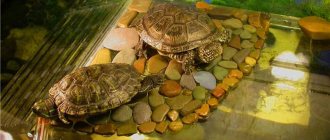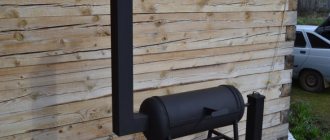A large number of species of aquatic turtles: marsh, red-eared and others need a small, well-heated island of land, since from time to time the turtles need air to breathe, and they also need a place to rest.
Without this, turtles may drown. Also, resting on land is good for the turtle's health; it does not develop some shell diseases. The island should be illuminated with heating conventional and ultraviolet light bulbs. The size of the resting place should be 3-4 times larger than the size of the turtle itself or 2 times larger than the sum of the sizes of all available turtles.
Some species of turtles most like shelters that are under water. If you can make a similar shelter on the island, the turtle will prefer it. Aquatic turtles do not require shelter directly on land.
Types of the island
Today there are several main types:
- Very popular types of shores that are created from glass. To do this, you will need to use ordinary glass, which is cut in the shape of a square, and its size should be 3 times larger than the dimensions of the pet. Then it is glued to the walls of the terrarium using a special glue or sealant. You need to glue stones or pebbles onto the glass surface itself using the same glue. Thanks to this, you can get rid of a slippery surface, and the pebbles can recreate a natural environment. Such dry land should have a ladder, which can be made from a similar piece of glass or rough plastic. The entire production process must be done only in a dry terrarium, and settlement can be carried out after a couple of days, when the glue and sealant have completely dried and the toxic odor has evaporated.
- The second option for sushi is to use tiles. It is worth noting that the tile has a smooth surface, so you will need to glue a piece of green rubber onto it, which will become like grass.
- For red-eared turtles, you can make a bank from wood, but before that the material is processed so that water does not affect the wood. Otherwise, the process of rotting will begin and the wood will release toxic substances into the water. Such material can be painted or used for processing with varnish. After treating the surface, it will be smooth, so you should immediately cover it with rubber or pebbles.
- One of the easiest options is to use large stones. They are of natural origin, which means they are completely safe for reptiles. In addition, their structure is rough, which means it does not require additional pasting. An excellent place for such a bank would be in the corner part of the terrarium. There is also another advantage - there is no need to drain water from the home for cleaning. Before you make an island for a turtle from a stone, you need to wash it with soap under running water and put it in boiling water and let it cook for 5-10 minutes.
Do not use foam for sushi. Of course, such raw materials may be ideal due to their roughness and the ability to preserve the body, but it crumbles, which means it will not withstand it for a long time. In addition, the pet can taste its island and choke on a piece of raw material.
If you don’t have the materials or the desire to make an island for turtles with your own hands, you can buy ready-made shores in a store or online. This method will save the breeder from unnecessary hassle and save time.
What materials are not suitable for creating an island?
When organizing a site in an aquarium, the use of the following ideas does not seem to be a very reasonable option:
- Foam plastic is easy to process, has a rough surface, holds well on water and retains heat. Despite these advantages, the material crumbles easily. Foam particles can get into the water. If a turtle decides to try one of these pieces, it may choke.
- Inflatable pillow - such an island will float well on the water. However, it will be difficult for the turtle to climb on it and hold on.
- A wooden board or driftwood - it’s easy to make an island for a red-eared turtle with your own hands from such materials. The use of natural material will not harm the health of the animal. At the same time, the wooden island will gradually begin to rot. Its particles will get into the water, which will spoil its quality and lead to the need for regular cleaning of the aquarium.
What should an aquarium be like for a red-eared slider?
An aquarium for a red-eared turtle is a small ecosystem that you can create in your home with your own hands. When choosing the size and type of aquarium, it is necessary to take into account the size of the adult animal and the characteristics of its body. This is a swimming reptile, which, in addition to water, vitally needs land, where it will bask and receive an ultraviolet tan. The land area must be at least 25% of the terrarium area. It should be securely fastened, or better yet, glued to the base of an artificial pond, especially if there are several turtles.
The volume of water in the aquarium is one of the most important points that needs to be treated with special attention. Red-eared turtles move and swim mainly underwater, where they feel safe, sometimes spending a long time at the bottom
In addition, the smaller the volume of water, the faster it becomes polluted, as a result of which the terrarium loses its decorative effect, and the turtle may simply get sick. For young individuals up to 10 cm in size, 100 liters of water is sufficient. And taking into account land and air space, the volume of the terrarium should be approximately 150 liters. As the animal grows, the aquarium for the red-eared turtle will have to be replaced with a larger one. The more water there is in the reservoir, the longer it will remain clean and transparent, and the more comfortable the turtle will feel.
The arrangement of a piece of land also needs to be approached with due attention. When creating an island for the red-eared turtle, it is advisable to provide a convenient approach to it
The shore should not end abruptly; it is better if it is equipped with a ladder or a miniature ladder with a rough but non-scratching surface. It can also be a large stone or a grotto, the slopes of which gradually flatten towards the very bottom of the aquarium. There is an ultraviolet lamp above the land, under which the turtle will dry its shell, bask and sunbathe. If the optimal water temperature for the red-eared turtle is approximately 25-280C, then above land it should be a couple of degrees higher. The island should be located approximately 30 cm below the edge of the terrarium, otherwise the animal may get out and run away.
When designing an aquarium for a red-eared slider, you need to choose safe materials without sharp edges and corners that pose a potential danger to the health of the animal. The soil covering the bottom should not be too fine, since turtles sometimes swallow it, and, in addition, it becomes dirty faster and is difficult to clean. It is better to use pebbles with a fraction of 5-6 cm. Live plants should not be used in such terrariums, as turtles eat them very quickly. They try to chew artificial algae, but, realizing that it is inedible, they quickly lose interest in it. Therefore, in the underwater part, you can install plastic or silk plants with weights at the base so that turtles cannot tear them out of the ground. Artificial vines can also be placed in the above-water part. In addition, the terrarium can be decorated with various driftwood, grottoes, fancy stones and other elements that will make the pond more picturesque and natural.
The aquarium for the red-eared turtle must be kept clean, since the health of the animal depends on the condition of the water. Various filters are used to purify water, which help maintain its quality in normal condition. In terrariums it is better to use external filters, since the internal ones quickly become clogged with suspended matter and lose effectiveness. In addition, to maintain ecological balance in the aquarium, you will need to regularly (once a week) replace half the volume of water.
Caring for a red-eared turtle, like any other pet, requires some effort. But a terrarium with clean water, a picturesque bottom and healthy animals is a fascinating sight that is worth the time and effort.
Raft for turtle - floating shore
Floating structures are convenient because they save space, are easily removed and do not interfere with cleaning the aquarium. You can make them yourself from scrap materials - plastic, cork. But it should be borne in mind that this type of sushi is only suitable as a temporary option. It is best to make a comfortable and reliable raft for your pet from wood or bamboo.
The material must first be treated with moisture-proof impregnation and varnished - then the wood will not rot from constant exposure to water. Vacuum suction cups can be used to secure the turtle raft under the lamps. You can buy them at a hardware store, and to glue them to the edges of the raft you will need silicone sealant.
IMPORTANT: When choosing treatment products, you must check that they do not contain harmful or toxic substances. Impregnations that are used for wood in a sauna or bathhouse are well suited.
Types of sushi
Islands can be made from different materials and using different technologies, but they can still be divided into 2 large groups:
- Inside the aquarium
- Beyond
Install the island so that the turtle cannot get out of the aquarium on it.
They are the same in operation, but when choosing between them you need to pay attention to the volume of water held. For one reptile, you need to calculate 100 liters of water; if it holds just this amount, then it must be filled completely, and the island must be placed outside
If it exceeds the specified volume by 2 times or more, then it can be filled halfway and an island placed inside.
An aquarium for one reptile - at least 100 liters of water.
We examined all aspects of self-building an island for your red-eared pet
The only thing left to pay attention to is the safety and reliability of the design. Also, do not forget that the territory of the island should be illuminated by a UV lamp
In order for the island to last a long time and not injure the pet if destroyed, it must be made from high-quality raw materials.
Island with suction cups
Such a shore can be purchased at a pet store with a department of goods for reptiles.
Trionics and other turtles that lead a completely aquatic lifestyle do not need land.
Most aquatic turtles, including red-eared turtles and marsh turtles, require a small, heated area of completely dry land. Turtles breathe atmospheric air and also need rest; without an island, the animal can drown. Also, the presence of sushi will prevent some shell diseases. An ultraviolet lamp and an incandescent lamp should be located above the island.
The size of the island should be 3-4 turtle sizes in length and width, or 2 times the sum of the sizes of all turtles in the aquarium.
Do-it-yourself islands for turtles
Aquatic turtles, despite the fact that their main habitat is water, need an island of land in their living space. If you do not provide the animal with a place where it can get out of the water and rest, the turtle will simply drown. In addition, it needs dry land to prevent certain shell diseases.
Video on how to make an island for turtles with your own hands
Basic requirements for islands for aquatic turtles
- Structural strength, stability and safety.
- It must be convenient for the turtle to climb onto the island, so it must be equipped with a ladder.
- Rough surface of the island and the ladder to it so that the turtle does not slip.
- Absolutely dry surface.
- Environmentally friendly materials.
- The walls of the aquarium must be at least 20 cm higher than the level of the island, otherwise the animal will escape from its home.
- The island must be heated with heating and ultraviolet lamps.
- The ladder should not be placed too close to the bottom, as the animal may get stuck between the ladder and the bottom and drown.
Glass islands
Made from pieces of glass with processed edges. On the surface of the glass you need to stick smooth pebbles, a special grass covering or a piece of soft polypropylene runner for the bathroom. Do-it-yourself islands for young red-eared turtles are best made “for growth,” since these penny-sized babies quickly turn into adults the size of a large man’s palm.
The island is glued to a dry and clean aquarium wall using aquarium sealant. When the turtle's housing is ready, it is necessary to leave it for several days until the glue has completely dried and weathered, and only then move the animal in.
Islands of stones
To equip the island, you can stack large stones. To make the structure strong and safe, the stones are first glued together with glue-sealant, well weathered and dried, and then placed in the aquarium.
Also, a large, stable stone is perfect for arranging an island.
Tile island
To make such an island, you need to choose tiles with a rough surface. To secure the ladder, you can drill two or three holes in it, or simply glue it with special glue.
Primary requirements
How to make an island for a turtle with your own hands, so that the reptile can rest comfortably and safely on it? When preparing such a site, you should pay attention to the following points:
- The size of the island is of decisive importance. It is desirable that its area is several times larger than the size of the turtle. If we are talking about keeping a group of such pets, the area needs to be truly spacious.
- When preparing an island for a turtle with your own hands, you need to consider how easy it will be for your pet to climb onto it. A good solution would be to install a special inclined ladder that is partially submerged in water.
- It is better if the surface of the island is textured. It will be much easier for the turtle to move on a rough surface.
- Making an island for a turtle with your own hands must be strong enough. The platform should not sag under the weight of the reptile.
- It is necessary that the surface of the island always remains above the water level. This will allow the turtle to dry out and warm its body while resting.
- You should not fix the platform at the very edge of the aquarium. The island should be located 15-20 centimeters below its top line. Otherwise, the turtle can get out and run away, getting injured in the process.
- The entire area of the island should be heated with an ultraviolet lamp. The creation of such an alternative to natural sunlight is necessary for the turtle for healthy growth and development of the body. In this case, you need to ensure that the temperature on the island is maintained within 30 o C. After all, the reptile can overheat.
Article on the topic: Do fish and turtles get along in the same aquarium together, with whom can you keep turtles?
DIY bridges for turtles
Many people have probably seen bridges for turtles in stores. These are environmentally friendly and safe products that are usually held on the walls of the aquarium using suction cups.
You can make such bridges for turtles with your own hands. The main condition for this is not to use untreated tree branches or driftwood. The fact is that pet stores sell bridges treated with a special impregnation that prevents wood from rotting. If you put an ordinary branch into the aquarium, the water in it will soon deteriorate and can even harm the health of the turtle in the same way as the wrong one.
DIY houses for land turtles
One turtle measuring 6 to 15 cm requires at least 0.5 m² of living space. As a terrarium for a turtle, you can use a low, long, wide and closed box with holes for ventilation.
The box can be made of wood, non-toxic impact-resistant plastic, glass or plexiglass. It should be borne in mind that these animals love privacy, so when choosing a glass house for them, only one wall should be left transparent. In addition, turtles often do not see transparent glass walls and can hit their shells against the glass, trying to pass through it.
However, most often turtles are kept in glass aquariums equipped with a shelter-house. Half of a clay flower pot, cut vertically, or half of a coconut would be perfect for such a house. You can make houses for land turtles with your own hands, or you can purchase them in specialized stores.
DIY plywood house
To work you will need:
- 4 identical plywood rectangles for the walls of the future house.
- One square piece of plywood for the roof.
- Glue for working with wood.
- Tools for woodworking.
- In two wall parts, wide arches should be cut into which the turtle will fit freely. If your animal is still small, it is recommended that when cutting out the entrance holes, make them the size of an adult animal. Otherwise, after a few months you will have to increase the size of the arches.
- Then the wall parts are connected using glue, and the roof of the house is glued on top. After treating with glue, the new home should dry and weather well.
- After about two days, you can move a new tenant into it.
Straw basket house
To arrange such a house you will need a rectangular basket, which can be purchased at any interior design store. Lay the basket on its side and make a bedding. Install heating and ultraviolet lamps above the house.
It is necessary to ensure that there is no draft in the terrarium and that the air temperature is maintained within 22˚C. Turtles are very sensitive to cold and can get pneumonia.
Have you made an island, a bridge, a house for your turtle? From what materials? Tell us about it in
Red-eared turtles are aquatic species of these animals. To keep them, you need a large and comfortable aquarium. It is correct to call it an aquaterrarium, because such a reservoir contains water and has access to land.
This animal is demanding about its place of residence. Therefore, you need to know how to arrange it in such a way as to create a natural habitat for it. Only in this case will this animal live a long life, free from disease.
Homemade bridge
The island can be made more impressive by building something like an arch made of stone or wood. This way you can create a beautiful bridge for a turtle, which will give your pet’s home an exotic look. It is better to use a large piece of plastic or plexiglass for the base of the structure. To make a bridge for a red-eared turtle with your own hands, you will need silicone sealant. Flat stones or pebbles are carefully laid out layer by layer, each piece is secured with glue. The height of the structure should be such that it protrudes several centimeters above the water, and the width should exceed the diameter of the animal’s shell. When the bridge to the aquarium is ready, you need to leave it to dry for 1-2 days.
Article on the topic: Mycoplasmosis in dogs - symptoms, danger and treatment
You can also make a bridge from wood - for this you use even blocks or neatly cut pieces of bamboo. It is also better to fasten them with sealant - the nails can rust from constant exposure to water.
Required parameters
For red-eared turtles, aquaterrariums consisting of 70% water are suitable - the rest should be land. In this case, water must be poured so that the reptile is completely immersed in it and can swim. The size of the turtle should take into account the growth rate of the pets. In a few years, a small individual can reach a length of 30 cm. In this regard, the parameters of the aquarium are selected as follows:
- for babies up to 10 cm in size, 50 liter containers are suitable;
- for medium-sized individuals from 10 to 16 cm, an 80-liter aquarium is sufficient;
- for large turtles up to 25 cm long, aquariums with a volume of 120 liters are required;
- For adult reptiles, large aquariums of 150 liters are required.
A suitable aquarium is usually purchased ready-made. It should be a rectangular or square glass container. Round or lens-shaped aquariums are not suitable for keeping turtles at home.
Homemade stone island
To make a stone island for your aquarium yourself, you will need to select pebbles or stones of a suitable size (at least 4-5 cm). It is better to choose flat stones with a rough surface. They need to be pre-treated at home - boiled over low heat for half an hour to kill all bacteria.
You can make an island for a turtle with your own hands from stone without the use of additional materials and tools. The water is drained from the aquarium and several layers of pebbles are laid out in one of the corners to create a slide of the required height. To stabilize the structure, you can use sealant, but it is better to choose stones that are flat enough to be held in place by their weight. They can be disassembled and washed when cleaning the aquaterrarium.
Decorative version of the island
An island for a red-eared turtle can not only serve as land, but also become a real decoration of an aquaterrarium. To make it, you can use dried and processed parts of coral masses, pieces of granite or wood, pick up bright pebbles or glue pebbles to an island of different colors. When laid out in a certain sequence, they will create an elegant pattern reminiscent of a mosaic. You can also use plastic plants, colored glass granules, and shells to decorate the surface.
Examples of design of suspended islands
- When arranging a hanging island, you can use glue to fix the entire structure to the aquarium wall. This fastening option is quite simple and has the greatest effect. However, the big disadvantage is that the glue may come into contact with the aquatic environment, which in turn will lead to damage to the water in the aquarium.
- You can create an island for a turtle using suction cups. But this type of fastening is not a very reliable method, since the suction cups can move along the aquarium walls, which can also lead to the dry land completely going under water.
- You can also cover tiles or glass with a corrugated material that has a rough finish. Sometimes some owners use a carpet that has a plastic base and a small pile size, which is placed on top of a smooth surface. As an option for arranging an island in an aquaterrarium, they also use small pebbles, which are fixed with glue to a smooth surface.
Although the red-eared turtle is an animal that spends most of its time in water, sometimes it still needs to get out onto land to rest, take oxygen and sunbaths. In this case, it is necessary to arrange an island for the turtle in the aquarium. And now we will tell you how to make it yourself.
Island of stones
How else to make an island for a turtle with your own hands? The least expensive solution in terms of wasted effort and time is to create a platform from large stones. Since the material is of natural origin, it will not harm the pet. Among other things, the stones themselves have a rough surface. Therefore, you won’t have to create any notches or glue them over.
Article on the topic: How many years do decorative house mice live, what they look like and what they eat
Before you start decorating the island, you should wash the stones in soapy water, then rinse them thoroughly. Finally, it is worth boiling the material in a saucepan for several minutes. The solution will destroy pathogenic microorganisms that could potentially concentrate on the surface of the stones.
It is recommended to place stones in one of the corners of the aquarium. You need to create a slide with a sloping plane. This is the only way the turtle can get to land without any problems.
Description of the species
Ornate turtles (Chrysemys) are divided into eight species. Their representatives live in various bodies of water in South and North America. The most famous of them is the beautiful and slender red-eared turtle.
Its shell reaches 28 cm in length. The pattern on it and coloring are individual for each individual. A characteristic feature of this species is two orange, red or yellow spots that are located on the sides of the head.
These turtles prefer shallow, swampy waters. In their homeland, they are more often called “red-eared sliders” for their special manner of running away from danger at very high speed, sliding their belly along the surface of the soil in order to quickly dive into the water.
Coastal development
An island for a turtle in an aquarium can be arranged in several ways:
The first type of arrangement refers to more practical methods, which are not only a neatly executed design, but also create the most comfortable conditions for your pet.
The island made using the second option is a more powerful design in appearance and design. Land of this type is most similar to the natural habitat of a turtle. In most cases, such an island is created from stones that overlap each other, and the sloping side must be of such a type that the turtle can safely go onto land without experiencing discomfort.
When creating a suspended structure, you can use:
The above materials are most suitable for designing a suspended structure, since they are hypoallergenic and do not in any way affect the quality of the water space in the turtle’s home. If you use wood that has been pre-treated with water-repellent agents or plastic, you can thus cause water poisoning with various toxins present in these materials.
When you build an island for a turtle using the second method, you can use:
The main advantage of these materials is their natural origin. There is no need to pre-treat the stones or prepare them in any way. However, their negative feature is their powerful dimensions. Consequently, if the suspended structure does not in any way affect the size of the water space, then the island in the form of a support on the bottom will take away free space from the turtle in the aquatic environment.
"...lonely, like an island in the ocean." Rules for building sushi
If you are setting up a beach for a turtle with your own hands, then the ideal ratio of land and water is 1:4. That is, land should occupy 25% of the area of the aquaterraria. This is provided that the shore or island is no less than 4 turtle sizes. If a whole flock of agile turtles lives in an aquaterrarium, then the land area should be several times greater than the total size of all the turtles.
1. Access to land, that is, a ladder or ascent, should be as convenient and safe as possible. Excessively steep inclines and sliding surfaces should be avoided. The ladder must have a corrugated and rough surface. The angle of elevation should be as obtuse as possible. It will be good if you build an island for the red-eared turtle with your own hands with an angle within 160°.
2. The shore should rise above the water surface by at least 25-50 (mm).
3. The land must be warmed up and exposed to ultraviolet radiation. You can read about how to properly organize lighting and heating of the shore in this section.
DIY shore for an aquatic turtle
How to build land?
A shore can be created:
- Based on suspended structure
With support on the bottom of the reservoir
Suspended structures have a more practical and aesthetic design. That is, a do-it-yourself hanging island for a turtle is a neat and sophisticated island that is created for the pet’s maximum comfort.
The shore supported by the bottom is more massive. Such designs look very natural and natural. Islands supported on the bottom are most often presented in the form of a large stone sculpture, which is simply immersed in a body of water, so that it looks out of the water by 25-50 (mm) and has at least one flat side along which the turtle will climb onto the island .
DIY turtle island
1. If you are creating a suspended bank for a turtle with your own hands, then you can use the following as building material:
- Ordinary glass with rounded edges
Tile without sharp edges
Why these materials? – The fact is that glass and tiles are completely hypoallergenic materials that do not change the chemical and structural composition of water. If you take plastic or wood impregnated with a water-repellent solution, then the water in the aquaterrarium will slowly but surely be poisoned by all kinds of toxins.
2. If you are building an island for a red-eared turtle with your own hands with support on the bottom, then you can use the following material as material:
- Large pebbles. These are large rounded blocks. You can take not just one pebble, but 3, 4 or all 5
Solid natural stone
Granite statue
corral reef
The advantage of these materials is their natural and natural texture. Stone blocks do not need to be processed or otherwise brought to perfection. The disadvantage of these materials is their massiveness. That is, if the suspended islands do not occupy the space of the reservoir. then the land resting on the bottom of the reservoir takes away precious water space.
Building an island in an aquaterrarium for a turtle
Examples of suspended islands
1. If you are building a shore for a turtle with your own hands with a suspended structure, then it is best to fix the island with glue to the wall of the aquaterrarium. This method is the simplest and most effective. But not everyone likes the use of “chemistry” in an aquaterrarium. The fact is that the glue can come into contact with water, which can lead to intoxication of the reservoir.
2. An alternative to glue are vacuum suction cups. But this solution does not have the highest reliability. The suckers may fidget along the wall of the aquaterrarium, or they may completely weaken and drown the land.
3. The glass or tiled surface must be covered with corrugated material with a high level of roughness. Some people install carpet with a plastic backing and non-absorbent pile over a smooth surface. Others, when building an island for a turtle with their own hands, equip the surface with pebbles, which are fixed with glue.
Related material: What water is suitable for red-eared turtles?
How to make an island for a turtle
Making a preliminary layout from thick cardboard:
If you create good living conditions for a turtle, it will please you for a long time
We cut glass to individual sizes ourselves, using special tools or using the services of a glazier.
Do not leave any sharp edges to prevent your pet from getting hurt.
We glue the island and the ladder to obtain a single structure:
We glue the structure inside the aquaterrarium:
Making a cozy home for your pet with your own hands is not at all difficult.
Cover the island with the selected coating:
In order for the use of an aquaterrarium with a new island to become safe, it is necessary to wait 2-3 days until the toxic substances have completely evaporated.
"...lonely, like an island in the ocean." Rules for building sushi
If you are setting up a beach for a turtle with your own hands, then the ideal ratio of land and water is 1:4. That is, land should occupy 25% of the area of the aquaterraria. This is provided that the shore or island is no less than 4 turtle sizes. If a whole flock of agile turtles lives in an aquaterrarium, then the land area should be several times greater than the total size of all the turtles.
1.
Access to land, that is, a ladder or ascent, should be as convenient and safe as possible. Excessively steep inclines and sliding surfaces should be avoided. The ladder must have a corrugated and rough surface. The angle of elevation should be as obtuse as possible. It will be good if you build an island for the red-eared turtle with your own hands with an angle within 160°.
2.
The shore should rise above the water surface by at least 25-50 (mm).
3.
The land must necessarily be warmed up and illuminated by ultraviolet radiation. You can read how to properly organize lighting and heating of the shore here.
How to build land?
A shore can be created:
- Based on suspended structure
- With support on the bottom of the reservoir
Suspended structures have a more practical and aesthetic design. That is, a do-it-yourself hanging island for a turtle is a neat and sophisticated island that is created for the pet’s maximum comfort.
The shore supported by the bottom is more massive. Such designs look very natural and natural. Islands supported on the bottom are most often presented in the form of a large stone sculpture, which is simply immersed in a body of water, so that it looks out of the water by 25-50 (mm) and has at least one flat side along which the turtle will climb onto the island .
1.
If you are creating a suspended bank for a turtle with your own hands, then you can use the following as building material:
- Ordinary glass with rounded edges
- Tile without sharp edges
Why these materials? – The fact is that glass and tiles are completely hypoallergenic materials that do not change the chemical and structural composition of water. If you take plastic or wood impregnated with a water-repellent solution, then the water in the aquaterrarium will slowly but surely be poisoned by all kinds of toxins.
2.
If you are building an island for a red-eared turtle with your own hands with support on the bottom, then you can use the following material as material:
- Large pebbles. These are large rounded blocks. You can take not just one pebble, but 3, 4 or all 5
- Solid natural stone
- Granite statue
- corral reef
The advantage of these materials is their natural and natural texture. Stone blocks do not need to be processed or otherwise brought to perfection. The disadvantage of these materials is their massiveness. That is, if the suspended islands do not occupy the space of the reservoir. then the land resting on the bottom of the reservoir takes away precious water space.
Examples of suspended islands
1.
If you are building a shore for a turtle with your own hands with a suspended structure, then it is best to fix the island with glue to the wall of the aquaterrarium. This method is the simplest and most effective. But not everyone likes the use of “chemistry” in an aquaterrarium. The fact is that the glue can come into contact with water, which can lead to intoxication of the reservoir.
2.
An alternative to glue are vacuum suction cups. But this solution does not have the highest reliability. The suckers may fidget along the wall of the aquaterrarium, or they may completely weaken and drown the land.
3.
The glass or tiled surface must be covered with corrugated material with a high level of roughness. Some people install carpet with a plastic backing and non-absorbent pile over a smooth surface. Others, when building an island for a turtle with their own hands, equip the surface with pebbles, which are fixed with glue.
Material
And others need a small, well-heated island of land, since from time to time turtles need air to breathe and also need a place to rest. Without this, turtles may drown. Also, resting on land is good for the turtle's health; it does not develop some shell diseases. The island should be illuminated with heating conventional and ultraviolet light bulbs.
The size of the resting place should be 3-4 times larger than the size of the turtle itself or 2 times larger than the sum of the sizes of all available turtles.
Some species of turtles most like shelters that are under water. If you can make a similar shelter on the island, the turtle will prefer it. Aquatic turtles do not require shelter directly on land.
Setting up an outdoor pool for a turtle
In this article we will look at two aspects: how to set up an outdoor pool for a turtle, as well as the pros and cons of such a solution.
If you are not sure that you can thoroughly follow all the recommendations, it is better not to try - the consequences of any negligence can be tragic for the animal. The main reason why owners want their tortoise outdoors is so that it gets some sunlight. Although terrariums have UV lamps, nothing can compare to the benefits of sunlight. Another important reason is fresh air and being in conditions close to natural. It is also possible that your turtle's tank is not that big and he needs the opportunity to be in a larger body of water. But remember: setting up and operating an outdoor pool will require the same amount of time and effort (if not more!) as organizing an indoor aquarium. In addition, outdoors the turtle will be faced with factors that are not present indoors: animals and birds, temperature changes, different weather conditions. Children's pool The most economical and practical solution is to purchase a children's pool. Inflatable pools are unreliable; it is better to buy a frame plastic pool. The pool should be placed in a sunny place, because this is the main purpose of the turtle being outdoors. If you choose an in-ground pond for your reptile, make sure it has a high-quality filtration system and is not cleaned with potentially hazardous chemicals, including those used against algae. . A horse trough will also work for deep-sea turtle species, but be sure to provide something that the turtle can use to climb onto land to rest. If you have a soft-shelled turtle, it is still best to use a kiddie pool, as they prefer shallow bodies of water.
Heating When it comes to sunlight, there are certain rules. Sadly, overheating is the No. 1 cause of death for turtles in outdoor pools. It is necessary to provide a source of shade over the pond! The ideal option is a lightweight structure, such as a plastic table, which you can move after the sun, creating shade. Do not cover the pond with boards or anything else: this will only increase the temperature. If the outside temperature exceeds 30 degrees, it is strongly recommended to leave only a small area of water exposed to the sun's rays. Check the water temperature in the pond regularly.
Wind If you are using a children's pool, you need to place something heavy at the bottom - a large pebble or cement block - because a strong gust of wind can tip the pool over.
Animals A cement block or cobblestone is also a subject of research for the turtle. Don't put your turtle in an empty pool; they hate it. They need shelter, including from animals that can wander even into a closed yard. Therefore, it is worth putting in the pool several artificial plants, a cave and a stone on which the turtle can bask. Always remove your turtle from the pool as evening approaches! Even an owl can be tempted by such easy prey.
Cleaning A swimming pool is easier to clean than an aquarium. Just take everything out of the water (except the sand) and pour out the water. Then take a hose and rinse the sides of the pool of algae, waste and everything else. Also hose down any items that were in the pool and rinse the sand thoroughly. Then fill the pool with water, add a dechlorinator (or just let the water sit for 24 hours) and put everything back. Make sure the pool water is at the right temperature. If you do not use a filter, this procedure will have to be repeated at least 3 times a week. The water should not smell bad and there should be no algae. If your pool has a lightweight cascade filter, the pool can be cleaned once a week.
Problems As we have already written, caring for an outdoor pool requires no less time and effort than an aquarium at home. In addition to regular cleaning of the aquarium, it is necessary to check the temperature in the pool every hour and monitor the well-being of the turtle, move the source of shade, etc. You can't just put a turtle in a pool and relax. An hourly check is the bare minimum. Therefore, it is better not to get involved in this activity if you do not have enough time for it. If your aquarium is spacious enough, equipped with ultraviolet lighting, etc. – an outdoor pool is not necessary. This is just a pleasant addition for your turtle in the warm season, but not a permanent place of residence. If you do organize an outdoor pool, study the behavior of the turtle when it is in it. If she often keeps her eyes closed, this may mean that there is something wrong with the water, perhaps there is still a lot of chlorine in it. If you think your turtle is acting strange, simply remove it from the pool and bring it indoors.
Source











